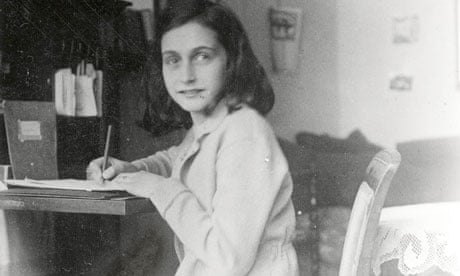Six hundred words were suggested to tackle the important question of whether it is "right and fair" to fictionalise real-life characters. I could answer it in 15.
Do what you like, only do it well – and don't expect the relatives to approve.
The Anne Frank Trust's objections to Sharon Dogar's book Annexed – which should probably bear the subtitle Peter Van Pels' Imaginary Diary – are good and fine, and exactly what foundations are meant to do (though anyone familiar with the workings of PR might note that their outrage is likely to prove counterproductive). Their concerns with the memory and reputation of Anne Frank are completely valid, and I can well understand and sympathise with their annoyance in regard to Dogar's novel. "I really don't understand why we have to fictionalise the Anne Frank story, when young people engage with it anyway," said a spokesperson for the foundation, and she is, of course, completely totally right.
And, at the same time, wrong.
The question of whether authors have the "right" to write about living or real people is not one that should be answered by the caretakers of historical reputation. Fiction is a free-for-all, and as long as an author can find someone who'll publish what they write (or these days, publish it themselves), there are no actual rules about who or what can be tackled, give or take a few libel laws.
Where would Shakespeare's history plays be without the freedom to reinterpret historical figures? Though even the great man himself may have pulled a few punches with Henry VIII, written a mere 75 years after the king's death (which corresponds more or less to the gap between Anne Frank's death and the publication of Dogar's novel), and carefully edited to exclude the last four wives and the execution of Anne Boleyn. This may have had something to do with the fact that the daughter of Henry and Anne was still on the throne, and more influential than any foundation.
More recently, Alan Bennett did it in The Uncommon Reader, in which (the real, current) Queen Elizabeth discovers a mobile library parked outside the kitchens of Windsor castle. The Queen and I by Sue Townsend imagines a post-republican queen living in a council flat in the Midlands, while Townsend's Queen Camilla posits ... well, the title gives a lot away. Philip Roth rerouted the second world war in The Plot Against America, George Eliot brought Piero di Cosimo to life in Romola. Susan Sontag reinvented Lady Hamilton's affair with Lord Nelson in The Volcano Lover, and Jeanette Winterson gave Napoleon a cook in The Passion. And let's not forget last year's (and probably the decade's) most wonderful work of immaculately researched and exquisitely imagined fiction, Hilary Mantel's Wolf Hall, in which Henry VIII, Thomas Cromwell and Anne Boleyn are given new and vigorous life.
All of this doesn't even begin to consider the literary (as opposed to historical) parasites. The zillion spin-offs of Pride and Prejudice could easily be considered a stain on the memory of Austen's classic, and the ones I've glanced at in bookshops have, indeed, been execrable (though to be fair, I loved the idea, at least, of Pride and Prejudice and Zombies). Peter Pan has a sequel. As does Winnie The Pooh and Gone with The Wind. Anne of Green Gables has a prequel. And these are just the ones I can count off the top of my head. I doubt any will be remembered with anything like the tenacity of the originals, which in the end, is judgment enough.
I was sent Sharon Dogar's Annexed in manuscript for a possible blurb, and though quite interested in the basic premise, I have to admit I didn't get very far with it. Lots of people might like it. (Lots of people liked The Boy In The Striped Pyjamas, whose author has also been quoted on the subject of tackling the Holocaust for children. I wasn't one of them.)
In the end, however, I have to quote Voltaire's biographer and admit that although I might not like what Dogar writes, I would defend to the death her right to write it.
Ok, not quite to the death.

Comments (…)
Sign in or create your Guardian account to join the discussion